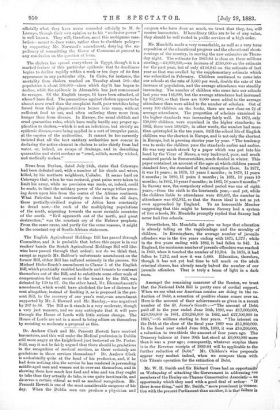The cholera has spread everywhere in Egypt, though it is
a marked feature of this particular epidemic that its deadliness begins to decline rapidly within a week or ten days of its first appearance in any particular city. In Cairo, for instance, the mortality from cholera reached on Tuesday about 500—the population is about 368,000—since which davit has begun to decline, while the epidemic in Alexandria has just commenced its ravages. Of the English troops, 14 have been attacked, of whom 9 have died. The precautions against cholera appear to be almost more cruel than the complaint itself, poor wretches being forced from their plague-stricken homes into camp, without sufficient food to eat, and often suffering there more from hunger than from disease. In Europe, the usual childish and cruel quarantine rules, which have really hardly any proper ap- plication to cholera,—which is not an infectious, but strictly an epidemic disease,—are being applied in a sort of irregular panic, at the caprice of the authorities. It cannot be too earnestly insisted that all the best sanitary authorities now concur in declaring the active element in cholera to arise chiefly from bad water, or, indeed, an escape of drainage, and in describing quarantine and strict cordons as "cruel, selfish, morally wicked, and medically useless."


































 Previous page
Previous page